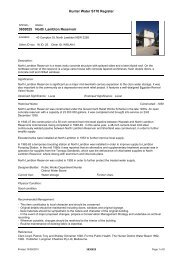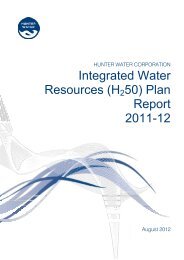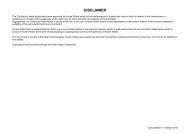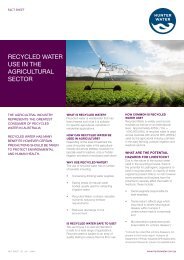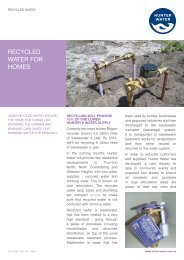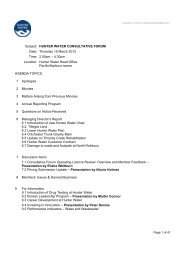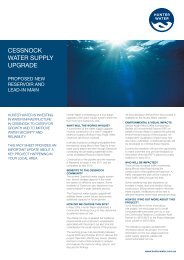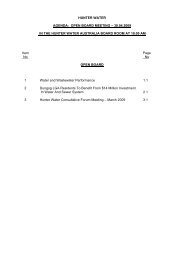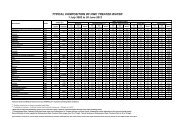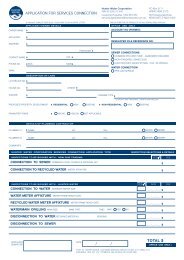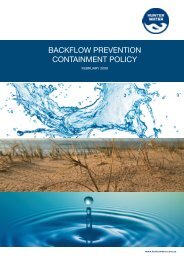Water Kit - Hunter Water
Water Kit - Hunter Water
Water Kit - Hunter Water
You also want an ePaper? Increase the reach of your titles
YUMPU automatically turns print PDFs into web optimized ePapers that Google loves.
1.1 the water cycle<br />
INTRODUCTION<br />
More than two thirds of the Earth’s<br />
surface is water, but only 3% of this is<br />
freshwater.<br />
Most of the 3% that is<br />
freshwater is locked up in polar ice<br />
caps, glaciers, the atmosphere and<br />
soil. Only a very small percentage of<br />
freshwater can be found in rivers, lakes<br />
and underground aquifers.<br />
The water cycle takes place around the<br />
world every moment of every day.<br />
Look up and you might see clouds<br />
building or transforming - that’s part of<br />
the water cycle. The rain falling on the<br />
ground or into waterways is part of the<br />
water cycle.<br />
Even theperspiration that you develop<br />
after physical activity joins the water<br />
cycle. These are all part of one amazing<br />
process that transforms water through<br />
different physical states - solid (hail,<br />
snow), liquid (rain), and vapour (mist,<br />
fog, perspiration).<br />
WATER IS IMPORTANT!<br />
There’s no point imagining daily life<br />
without water. The fact is we cannot<br />
live without it. It is crucial for the<br />
survival of all living organisms.<br />
Consider the following facts:<br />
• A human body is around 70%<br />
water. Our muscles have more<br />
water than any other body tissues,<br />
and our brains are 75% water.<br />
• We lose 3 to 3.5 litres of water<br />
in an average day, more in hot<br />
weather or when we exercise. So,<br />
we need to replace water in<br />
our body.<br />
• At most a person could survive<br />
three to four weeks without food,<br />
but less than one week without<br />
drinking water.<br />
• Lose 10% of your body water and<br />
you can barely walk. Lose 20%<br />
and you’re in real trouble. <strong>Water</strong><br />
cools the body, it helps carry<br />
nutrition through the system, and<br />
carries out wastes.<br />
DAILY WATER USE<br />
Think about how you use water<br />
every day.<br />
The table below provides a summary.<br />
where<br />
Home<br />
School<br />
Industry<br />
Agriculture<br />
Recreation<br />
Healthcare<br />
Ecosystems<br />
examples of water use<br />
Cooking<br />
Drinking<br />
Cleaning<br />
Bath and shower<br />
Toilet<br />
Washing cars<br />
Washing clothes<br />
Washing windows<br />
Gardens<br />
Pool<br />
Toilets<br />
Drinking<br />
Cooking<br />
Cleaning<br />
<strong>Water</strong> features and gardens<br />
Keeping fish, turtles, tadpoles<br />
Conducting lab experiments<br />
Making materials eg bricks, timber<br />
Dust minimisation spraying<br />
Mixing materials eg concrete<br />
Stock watering<br />
Irrigating crops and pastures<br />
Washing out dairy sheds<br />
Processing milk products<br />
Processing crops eg cotton<br />
Drinking<br />
Irrigation of sports fields, gardens<br />
Establishing shade trees<br />
Swimming pools<br />
Making sporting equipment, like<br />
goalposts, balls and wooden bats<br />
Cooking<br />
Drinking<br />
Cleaning<br />
Bathing<br />
Sterilising equipment<br />
Surgical operations<br />
Survival and habitat for animals<br />
Survival and growth for plants<br />
Flowing rivers, creeks, streams<br />
Moderator of temperature extremes<br />
Dissolving nutrients for uptake by<br />
plants and animals<br />
<strong>Water</strong> kit . ssS . 001 . april 2010 1




